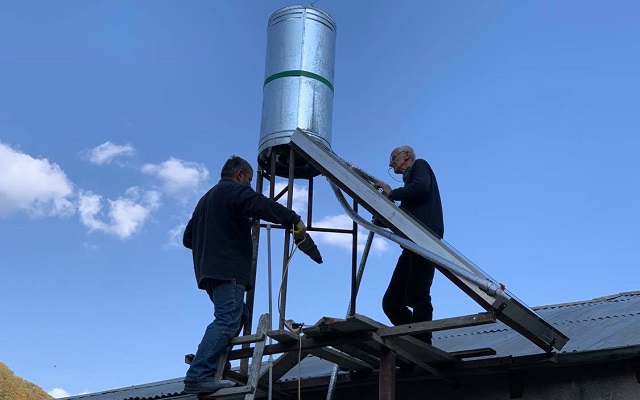Community based sustainable forest management in Pshavi Forest Georgia

The condition of Georgia’s state forests has deteriorated dramatically in the last 30 years due to overuse for commercial logging, firewood consumption as well as overgrazing. At the same time, greenhouse gas emissions (GHG) have increased. The project helps to reduce GHG emissions by mitigating human impacts on Georgia’s mountain forests and by implementing sustainable forest management practices in the Pshavi highland forests, a mountain region of Mtskheta-Mtianeti. The project intends to contribute to GHG mitigation on multiple levels by raising awareness, introducing “climate-smart technologies”, such as solar collectors and wood-saving stoves and developing sustainable forest management practices with the participation of the population. Additionally, it implements environmental education measures in the region and develops a plan for the sustainable use of the mountain forest together with the local government.
INITIAL SITUATION
Over the last 30 years, the increase in the use and consumption of forests in Georgia has led to an imbalance between consumption and growth. The condition of the forest has deteriorated to a degree where its ability to recover is impaired and its potential for climate regulation is significantly reduced. The forest losses exacerbate the increase in greenhouse gas emissions and hamper sustainability and the conservation of biodiversity.
The project region is located around Dusheti municipality in the Pshavi area, which is part the Mtskheta-Mtianeti region on the southern slope of the Caucasus. The area is characterized by a difficult terrain and harsh climate, surrounded by natural deciduous forests, rich in biodiversity. These forests, though, suffer severely from excessive logging caused by economic activities as well as deforestation by local populations, since firewood is the main source of energy in this region. A first response to this was the establishment of the Pshav-Khevsureti National Park (2014) and the Aragvi protected landscape (2020) a few years ago. The project cooperates with these initiatives.
TARGET GROUP
The project targets more the 340 people in 4 villages in the Pshavi region. The local population lives mostly under difficult conditions. Incomes in the region are low, and infrastructure is sparse. The greater part of the population lives under the poverty line. Most people do not have a comfortable living environment and little access to adequate hygiene facilities.
The project’s target villages are experiencing an increasing outflow of qualified young workers. Most of the inhabitants are engaged in agriculture, where the main sources of income are livestock or secondary forest products. The villages so far have no central drinking water supply and the main source of energy, apart from electricity, remains to be firewood. The project addresses all stakeholders in the target region: farmers, youth, policymakers and media representatives.
APPROACH AND ACTIVITIES
The project uses a combined approach of awareness raising for climate change impacts and practical application of climate-efficient technologies. It involves the population at different stages in information and education campaigns as well as decision-making processes. In the first step, the project provides training and information material on the local effects of climate change countermeasures such as sustainable forest- and pasture management and sustainable energy. In addition, it establishes local participation opportunities in the form of a coordination council. The local government is involved in all activities. The project further cooperates with the local government to develop a plan for the sustainable use of the mountain forest. In order to increase outreach and transparency, the information and activities are also mediated and shared in various audio and video formats.
These information and participation campaigns are complemented by the direct application and implementation of climate-efficient technologies in the population. The project equips 40 model households with renewable and energy-efficient technologies. This includes the use of energy-efficient stoves, solar water heaters, fruit dryers, and biomass bricks. Replacing firewood with renewable energy resources and energy efficient technologies reduces wood consumption and with that greenhouse gas emissions, while increasing the living conditions in these rural areas.
In addition, the project conducts target group-oriented workshops and environment education measures on the use of climate-smart technology and their socio-economic benefits, helping both to combat the impacts of climate change and to reduce poverty.
LATEST PROJECT HIGHLIGHTS AND IMPACTS
- Project finalized.
- 53% of workshop participants report increased awareness of the use of renewable and energy-efficient technologies
- Installed solar water heaters in 20 houses and thermal insulation in 32 houses
- Installed 51 energy-efficient stoves
- 58% of the population are aware of sustainable forest management and conservation measures
ABOUT THE ORGANISATION
The goal of The Greens Movement of Georgia/Friends of the Earth-Georgia is to equally protect environment, human and ethno-cultural surroundings according to the principles of sustainable development. It aims to establish ecologically safe technologies and to build solidarity and peace among people. They define environmental protection and the reduction of adverse anthropogenic impacts on the environment as their task and responsibility in order to harmonize human and natural processes.
